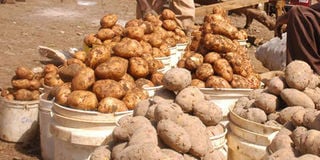Inmates to help in boosting potato yields

Potatoes for sale in a market in Nyeri. Interior CS Fred Fred Matiang’i and her Public Service counterpart Prof Margaret Kobia recently launched an initiative that will see inmates in correctional facilities in Nyandarua working for the seed potato production centre at the 350-acre Tumaini NYS Field Station in Nyandarua County. FILE PHOTO | NMG
What you need to know:
- Interior CS Fred Fred Matiang’i and her Public Service counterpart Prof Margaret Kobia recently launched the initiative, starting with a seed potato production centre at the 350-acre Tumaini NYS Field Station in Nyandarua County.
- The prisons and NYS are among Kenya’s biggest institutional landlords, owning some 120,000ha of land spread across the country, but largely underutilised for decades.
- Agricultural engineer and head of farming enterprises at the Prisons department, Patrick Kariri, says the institution has scaled up its recruitment of skilled personnel in diverse agricultural disciplines.
- Although Karlo introduced new earophonic potato seed production technology in 2008, this will be the first time it will be deployed for mass production.
The government has rolled out a project that will see inmates in correctional facilities turned into mass food producers.
The project involves deploying some 30,000 inmates and some 50,000 National Youth Service servicemen and women to scale-up potato production.
Kenya boasts of favourable potato production climate and reservoirs of millions of small-scale farmers skilled in crop husbandry, but studies show potato imports from Egypt, South Africa and Europe had more than tripled to meet growing local demand fuelled by rising urbanisation and declining local production.
Interior CS Fred Fred Matiang’i and her Public Service counterpart Prof Margaret Kobia recently launched the initiative, starting with a seed potato production centre at the 350-acre Tumaini NYS Field Station in Nyandarua County.
The State says among benefits envisaged from the project include reducing the burden on taxpayer budget allocations to feed thousands of inmates and NYS servicemen.
The prisons and NYS are among Kenya’s biggest institutional landlords, owning some 120,000ha of land spread across the country, but largely underutilised for decades.
According to the National Potato Council of Kenya, nationally, only 160,000ha is devoted to potato production, the bulk of it (83 per cent) by some 800,000 small-scale farmers and the rest by medium and large-scale farmers.
The biggest hindrance to potato production is lack of quality seed potato and poor access by farmers. The new vision to change this is to raise production from current 275 metric tonnes to 4,390MT.
SEED PRODUCTION TECHNOLOGY
This will be achieved by raising high-yielding certified seed potato production capacity from the current 3 per cent to 10 per cent of demand by next year at NYS Tumaini Field Station.
Zeinab Hussein, the Correctional Services PS, says the choice of potato was due to its status as Kenya’s second largest staple food item after maize. The crop has huge potential to improve food security and household incomes.
Agricultural engineer and head of farming enterprises at the Prisons department, Patrick Kariri, says the institution has scaled up its recruitment of skilled personnel in diverse agricultural disciplines.
“We also have Kenya Plant Health Inspectorate and Kenya Agricultural and Livestock Research Organisation technical cadres involved in driving the potato seed project,” he said.
During the launch, Dr Matiang’i said collaboration with Nyandarua County government in development of cold room storage and processing facilities is expected to reduce post-harvest wastage.
Although Karlo introduced new earophonic potato seed production technology in 2008, this will be the first time it will be deployed for mass production.
The technology involves use of air-mist jets in special greenhouse conditions to grow mini-seed tubers from cultured plantlets to produce mini potato tubers which are later transferred to seedbeds for bulk multiplication.
Dr Matiangi’i and Prof Kobia have publicly given their word on the project. “It will happen,” Prof Kobia said.




